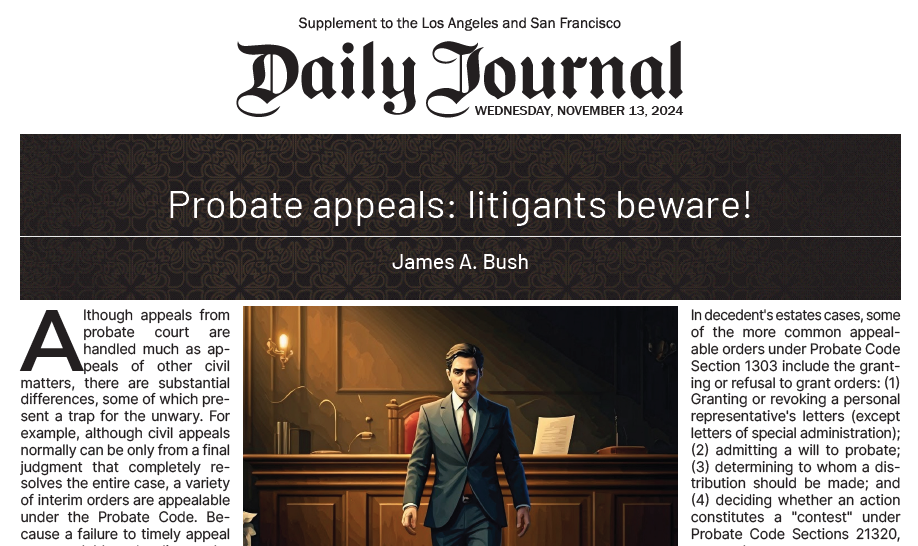Home » Probate Services » Probate Appeals
Probate Appeals
In the probate court, it is unlikely that every party will be satisfied with the outcome of a case. However, while it is rare, if you believe a mistake was made during the court proceedings that led to an imbalanced or incorrect ruling, requesting an appellate court to review the decision may be an option that’s available to you.
If you act promptly and have an attorney with substantial appellate court experience by your side, you may be able to successfully appeal a probate court decision.
Definition
What Is a Probate Appeal?
A probate appeal asks the appellate court to review the lower court’s final decision on a probate matter.
Simply disagreeing with the court’s decision is not a basis for a probate appeal. Generally, to have grounds for an appeal, you must be able to show from the record before the probate court that the probate judge made a mistake in interpreting or applying the law, committed an error in deciding what evidence could or could not be considered, or had no basis from the facts before it to support the decision made.
To enable them to effectively carry out their duties, fiduciaries generally are granted a great deal of power; however, with power comes the potential for abuse. The sad reality is that many fiduciaries improperly use their power for personal gain or other unethical reasons instead of using it to make decisions that benefit the persons they represent. When they breach their duties in this way, it is considered fiduciary misconduct.
Luckily, if fiduciary misconduct is discovered early, legal actions can be taken to reverse the damage the fiduciary caused. By working with Keystone’s skilled fiduciary misconduct attorneys, you can devise a strategy to achieve your litigation goals, which may include forcing the fiduciary to comply with your requests, removing and replacing the fiduciary and/or surcharging them for any damage they caused.

While it is necessary to demonstrate error to be successful in your appeal of a probate court decision, that is not enough to have a solid chance at winning an appeal in probate court. You also have to prove that the alleged error was prejudicial, meaning that it affected the outcome of the case. To determine this, ask yourself: If the error hadn’t been made, would the court’s decision have been different? If the answer is yes, then you probably have grounds to launch a probate appeal. If the answer is no, the appellate court will likely deny your appeal.
Keystone’s team of probate appeal attorneys can review the facts of your case with you to determine what your chances are of successfully appealing a probate decision. They possess the expertise to guide you through the complex probate appeals process.
Why Would You Need a Probate Appeal Attorney?
In your initial probate case, did you offer evidence that the court, in error, refused to consider? Did the court incorrectly interpret the law? Did the court’s error change the outcome of the case? Do you believe that the probate court lacked sufficient evidence to support its decision?
It is important to note that a probate appeal is not a new trial; it just provides an opportunity for a higher court to review a lower court’s decision to determine whether the court had made mistakes during the trial.
If you believe your probate case was negatively impacted by a court error, a Keystone probate appeals lawyer can help you file an appeal to try to overturn the original decision.
Requirements for Filing a Probate Appeal
For a probate court appeal to have merit, your case must satisfy certain criteria. Not only will you have to explain the law and facts that show prejudicial error by the probate court, but you also will have to comply with all appeals procedures if you are to have any chance of winning your appeal—and these procedures are different from the procedures you and your trial attorney had to follow in your probate court trial.One of the most important things to be mindful of during the probate appeals process is time limits. Probate court appeals must be brought within a short, specified time after the final order is entered; otherwise, they are time-barred. California Rule of Court 8.104(a)(1) sets the time limits for appeals, which may be as short as 60 days after the judgment or order is entered. Ideally, you should retain a probate appeals attorney as soon as you are notified of the probate court’s unfavorable decision.
Requirements for Filing a Probate Appeal
California law is specific about the types of probate decisions that can be appealed. It is California Probate Code section 1300 that governs general appealable probate decisions and allows appeals from the making of, or the refusal to make, any of the following orders:
“(a) Directing, authorizing, approving, or confirming the sale, lease, encumbrance, grant of an option, purchase, conveyance, or exchange of property.
(b) Settling an account of a fiduciary.
(c) Authorizing, instructing, or directing a fiduciary, or approving or confirming the acts of a fiduciary.
(d) Directing or allowing payment of a debt, claim, or cost.
(e) Fixing, authorizing, allowing, or directing payment of compensation or expenses of an attorney.
(f) Fixing, directing, authorizing, or allowing payment of the compensation or expenses of a fiduciary.
(g) Surcharging, removing, or discharging a fiduciary.
(h) Transferring the property of the estate to a fiduciary in another jurisdiction.
(i) Allowing or denying a petition of the fiduciary to resign.
(j) Discharging a surety on the bond of a fiduciary.
(k) Adjudicating the merits of a claim made under Part 19 (commencing with Section 850) of Division 2.”
Estate Appealable Decisions
In regard to a decedent’s estate specifically, California Probate Code section 1303 allows an appeal from the granting, or refusal to grant, these orders:
“(a) Granting or revoking letters to a personal representative, except letters of special administration or letters of special administration with general powers.
(b) Admitting a will to probate or revoking the probate of a will.
(c) Setting aside a small estate under Section 6609.
(d) Setting apart a probate homestead or property claimed to be exempt from enforcement of a money judgment.
(e) Granting, modifying, or terminating a family allowance.
(f) Determining heirship, succession, entitlement, or the persons to whom distribution should be made.
(g) Directing distribution of property.
(h) Determining that property passes to, or confirming that property belongs to, the surviving spouse under Section 13656.
(i) Authorizing a personal representative to invest or reinvest surplus money under Section 9732.
(j) Determining whether an action constitutes a contest under former Chapter 2 (commencing with Section 21320) of Part 3 of Division 11, as that chapter read prior to its repeal by Chapter 174 of the Statutes of 2008.
(k) Determining the priority of debts under Chapter 3 (commencing with Section 11440) of Part 9 of Division 7.
(l) Any final order under Chapter 1 (commencing with Section 20100) or Chapter 2 (commencing with Section 20200) of Division 10.”
Trust Appealable Decisions
As for trusts, California Probate Code section 1304 allows an appeal from the granting, or refusal to grant, these orders:
“(a) Any final order under Chapter 3 (commencing with Section 17200) of Part 5 of Division 9, except the following:
(1) Compelling the trustee to submit an account or report acts as trustee.
(2) Accepting the resignation of the trustee.
(b) Any final order under Chapter 2 (commencing with Section 19020) of Part 8 of Division 9.
(c) Any final order under Part 1 (commencing with Section 20100) and Part 2 (commencing with Section 20200 ) of Division 10.
(d) Determining whether an action constitutes a contest under former Chapter 2 (commencing with Section 21320) of Part 3 of Division 11, as that chapter read prior to its repeal by Chapter 174 of the Statutes of 2008.”
Other Protective Appealable Decisions
There also are specific statutes governing appeals from protective proceedings, such as guardianships and conservatorships (California Probate Code section 1301), and from cases under the Conservatorship Jurisdiction Act (California Probate Code section 1301.5), Power of Attorney Law (California Probate Code section 1302), and Health Care Decisions Law (California Probate Code section 1302.5).Who Our Probate Appeals Lawyer Represent
Successfully appealing a probate court decision is no easy feat; therefore, any person who was previously a litigant in a probate case will benefit from the counsel of a Keystone probate appeals attorney. Our team possesses extensive litigation and appeals experience, a thorough understanding of the procedures involved in the appeals process, and an excellent track record of securing for their clients the outcomes they want in court.
In probate appeals cases, Keystone is able to assist both clients who are seeking to bring an appeal and clients who are seeking to defend an appeal. Below are some of the types of clients we represent in probate appeals matters.
Executors and Administrators
Executors and administrators may have been named in a fiduciary misconduct claim or litigated on behalf of the estate they represent. Keystone can help executors and administrators bring or defend a probate appeal.

Trustees
Trustees may have been involved in a fiduciary misconduct claim or litigated on behalf of the trust they manage. Keystone can help trustees bring or defend a probate appeal.

Beneficiaries
Beneficiaries may have previously litigated in a will or trust dispute, fiduciary misconduct claim, financial abuse claim, or other type of probate matter. Keystone can help beneficiaries bring or defend a probate appeal.

Spouses
In the event a conservator or guardian has breached their duties, Keystone can help the families of the victims bring litigation against the fiduciary who acted improperly. Keystone can also defend conservators and guardians who feel they have been wrongfully accused of misconduct.

Conservators
Conservators may have been brought to court for a conservatorship abuse matter or litigated on behalf of the adult they were charged with protecting. Keystone can assist conservators with bringing or defending a probate appeal.

Attorneys-in-Fact
Attorneys-in-fact may have had a claim filed against them for power of attorney abuse or litigated on behalf of the principal. Keystone can help attorneys-in-fact bring or defend a probate appeal.

Creditors
Creditors may have previously tried to enforce a judgment in the probate court relating to debts owed by a decedent or beneficiary. Keystone can assist creditors bring or defend a probate appeal.

Case Studies of Our Probate Appeal Services
Keystone is dedicated to its clients, providing each one with individualized support and guidance to help them through the appeals process. Our attorneys have the experience to vehemently fight for and defend your rights, as demonstrated by the case studies below.

Appellate Court Upholds Ruling Invalidating Trust Amendment and Disinheriting Disqualified Beneficiary
Keystone’s client was the godson of the decedent, and he, along with the decedent’s property manager, were named as 50/50 beneficiaries and co-trustees of the decedent’s trust. The decedent, however, subsequently executed a trust amendment that reduced his godson’s share to $200,000 and increased the property manager’s share to 100% of his multimillion-dollar estate. Keystone and its co-counsel challenged the amendment by alleging that the property manager had not only unduly influenced the decedent, but also had committed financial elder abuse against him. We additionally asserted that the property manager was a prohibited transferee who transcribed the amendment. After a multi-day trial, the court invalidated the amendment and disinherited the property manager, who, as a result, was disqualified from receiving his 50% share under the terms of the original trust. The court also awarded Keystone’s client his attorney’s fees and costs in the amount of $324,719.96. The property manager appealed the probate court’s decision; however, the appellate court affirmed the ruling.

Appellate Court Upholds Decision Allowing Creditor to Secure 100% of Debtor-Beneficiary's Distribution From a Spendthrift Trust
In the published decision Blech vs. Blech, a decedent had created a trust that named his four children as the primary beneficiaries. The trust contained a spendthrift clause, which meant that beneficiaries would not be permitted to sell, assign, transfer or give away their interests in the trust to third parties, nor would third parties be permitted to take or buy any of the beneficiaries’ interests.
The terms of the trust called for the trustee to pay a percentage of the principal to beneficiaries annually on the anniversary of the decedent’s death. However, almost immediately following the decedent’s death, litigation ensued between the beneficiaries that resulted in a settlement agreement, which, among other things, called for one of the beneficiaries to pay Keystone’s client, another beneficiary, a settlement amount. The beneficiary failed to fulfill this obligation, so Keystone’s client secured a judgment against him and later filed a petition with the probate court seeking to apply the debtor-beneficiary’s annual distribution to the satisfaction of the judgment. Due to the existence of a spendthrift clause, the probate court limited the amount Keystone’s client could secure to 25% of each annual distribution received by the debtor-beneficiary. Around this same time, the California Supreme Court in Carmack vs. Reynolds expanded the reach of creditors to access trust distributions, even if the trust in question has a spendthrift clause. Because of this ruling, Keystone’s client was able to secure a judgment to secure the remaining 75% of the debtor-beneficiary’s trust distributions. The debtor-beneficiary appealed the decision; however, the appellate court sided with Keystone’s client and upheld the probate court’s ruling. With this case, Keystone set the standard for how to secure the entirety of a debtor-beneficiary’s distribution from a spendthrift trust to satisfy a judgment.

Appellate Court Overturns Probate Court Decision and Awards Plaintiff Substantial Share of Trust

Appellate Court Reverses Probate Court’s Decision to Dismiss Petition Seeking to Enforce Trust’s No-Contest Clause
Our Probate Appeals Law Firm
Keystone is one of the largest probate litigation firms in California. Probate lawyers require specialized training and qualifications, and they must be dedicated to constantly expanding their knowledge of probate law, including the probate appeals process. Every attorney at Keystone possesses the expertise to represent you in a probate appeals case. We can help you secure the resolution you want.
We’re proud to help clients whose cases comply with California’s probate appeals requirements. We look forward to working with you.
Our Probate Appeals Lawyers
Our attorneys focus exclusively on probate law and have extensive knowledge of the field as a result. We will utilize this knowledge to serve you in bringing or defending your probate appeals case. Members of our team have earned many accomplishments and accolades, including:
- The opportunity to present on probate litigation and administration topics to professionals across various fields, including attorneys and CPAs
- Recognition for outstanding performance in several legal publications, including Super Lawyers, Daily Journal and Best Lawyers®
- Stints teaching law students the ins and outs of wills and trusts
- Certification as Specialists in Estate Planning and Trust and Probate Law by the Board of Legal Specialization, State Bar of California.
Locations We Serve
We serve all cities and counties in California, including but not limited to the following:
- Los Angeles County
- Orange County
- San Diego County
Frequently Asked Questions
Probate Appeals FAQs
In this section, you can find answers to some of the questions we receive from our clients regarding probate appeals. If you have additional questions, please contact our team of probate lawyers for more assistance.
Information about the types of probate decisions that can be appealed can be found in California Probate Code sections 1300, 1303 and 1304. But remember: A decision cannot be appealed simply because you disagree with it; the probate court should have made an error that affected the outcome of the case.
Learn More
Discuss Your Case with a Probate Attorney
The probate appeals process can be complicated. Having a knowledgeable probate appeals lawyer in your corner can be invaluable in defending or taking an appeal to court. Speak to one of our attorneys as early as today by requesting a call for a free consultation.




